Chess: Understanding the Giuoco Piano Opening (Two Knights) Part III
1 e4 e5 2 Nf3 Nc6 3 Bc4 Nf6 4 d4 exd4 5 O-O Nxe4
6 Re1 d5 7 Bxd5 Qxd5 8 Nc3 Qa5 9 Nxe4 Be6
10 Bd2 Bb4 11 Nxd4 Nxd4 12 c3 O-O-O 13 cxb4
13 ... Qf5 14 Rc1 Bxa2 15 Rc5 Bd5 16 Bg5
(Canal's Variation)

Also available:
Chess: Understanding the Giuoco Piano
(Two Knights) Part I
http://chesscoach1950.blogspot.com/2006/01/chess-understanding-giuoco-piano-two.html
Chess: Understanding the Giuoco Piano
(Two Knights) Part II
http://chesscoach1950.blogspot.com/2006/08/chess-understanding-giuoco-piano-two.html
For explanations of moves 1 through 3
please refer to:
Chess: Understanding the Giuoco Piano
(Two Knights) Part I
http://chesscoach1950.blogspot.com/2006/01/chess-understanding-giuoco-piano-two.html
1 e4 e5 2 Nf3 Nc6 3 Bc4 Nf6 4 d4 exd4
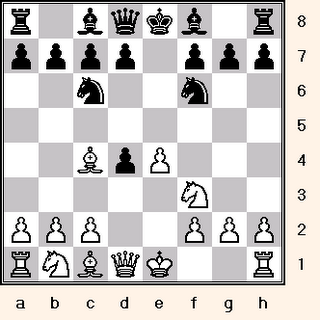
5 O-O

5 ... Nxe4
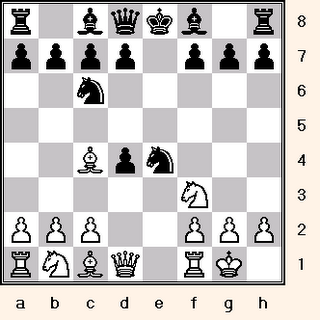
Initiating Canal's Variation.
6 Re1
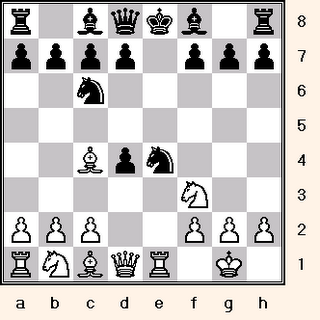
(i) Threatens 7 Rxe4.
(ii) Pins the knight to the King.
6 Nc3? Nxc3 (not 6 ... dxc3? 7 Bxf7+! Kxf7
8 Qd5+ Ke8 9 Re1 Be7 10 Rxe4 d6 11 Bg5 cxb2
12 Rae1, with a powerful attack for White)
7 bxc3 d5 8 Bb5 Be7 9 Nxd4 Bd7 and Black
is up a pawn.
6 Nc3
6 Nxd4
6 Bd5
6 ... d5
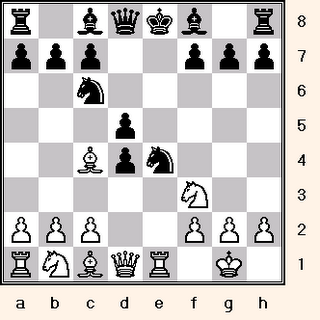
(i) Attacks c4.
(ii) Protects e4.
(iii) Frees the c8 bishop.
6 ... Be7
6 ... f5
7 Bxd5
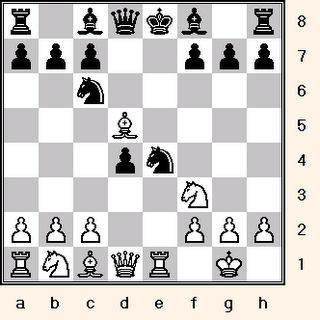
Black gets an advantage after: 7 Nc3 dxc4
(7 ... dxc3 8 Bxd5) 8 Rxe4+ Be6 9 Nxd4 Nxd4
10 Rxd4 Qf6 11 Nb5 Rc8 12 Nxa7 Bc5 13 Rf4 Rd8.
7 Nc3
7 Nxd4
7 Bb5
7 ... Qxd5
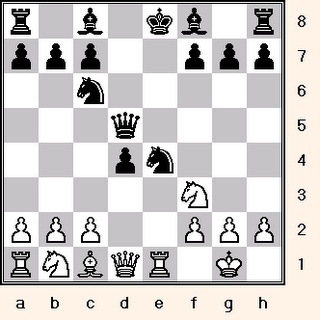
8 Nc3
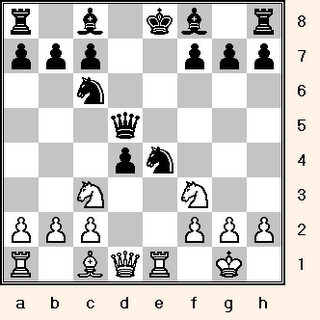
8 ... Qa5
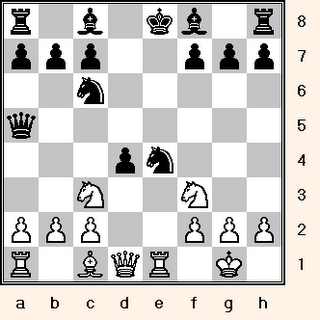
8 ... Qh5 9 Nxe4 Be6 10 Bg5 (10 Neg5 O-O-O
11 Nxe6 fxe6 12 Rxe6 Bd6) 10 ... Bd6 11 Nxd6+
11 ... cxd6 12 Bf4 Qd5 13 c3 Rc8.
8 ... Qh5
8 ... Qd8
8 ... Qf5
8 ... Qc4
9 Nxe4
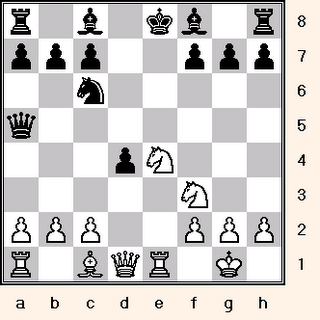
Thus, White regains his piece.
9 Rxe4+? Be6 10 Nxd4 O-O-O.
9 Nxd4
9 Rxe4+
9 ... Be6

9 ... Be7
9 ... Ne7
10 Bd2

10 Neg5 (10 Bg5 h6 11 Bh4 Bb4 12 Re2 g5 13 Bg3 O-O-O)
10 ... O-O-O 11 Nxe6 fxe6 12 Rxe6 Bd6.
10 Neg5
10 Bg5
10 Nfg5
10 ... Bb4
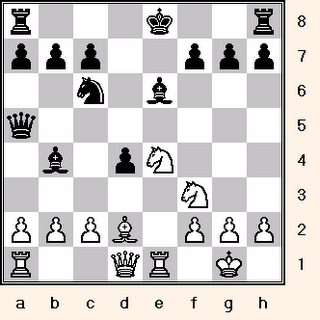
10 ... Qd5
10 ... Qf5
10 ... Qh5
10 ... Qa4
10 ... Qb6
10 ... Qb5
11 Nxd4

11 Bxb4
11 c3
11 ... Nxd4
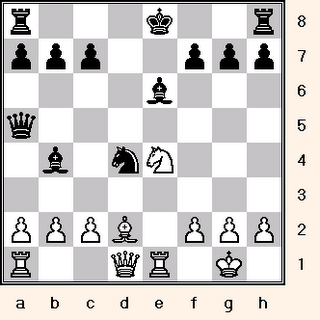
11 ... Bxd2
11 ... O-O
12 c3

12 Bxb4
12 ... O-O-O

12 ... Be7
12 ... Ne2+
12 ... O-O
12 ... Qb6
13 cxb4

13 cxd4? Bxd2 14 Qxd2 Qxd2 15 Nxd2 Rxd4.
13 Kh1
13 Rc1
13 b3
13 ... Qf5
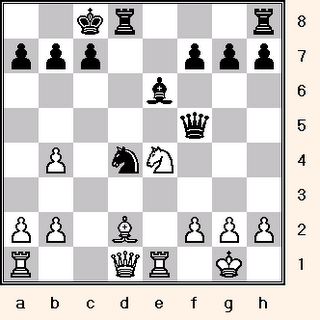
13 ... Qd5
13 ... Qb6
14 Rc1

14 Bc3
14 Qc1
14 Qa4
14 ... Bxa2

14 ... Kb8
14 ... Rd5
14 ... Bd5
14 ... h5
14 ... Qg4
15 Rc5

15 Qa4
15 Bc3
15 Ng3
15 ... Bd5

15 ... Qg6
15 ... Bb3
16 Bg5

16 Bc3
16 Ng3
By ChessCoach@care2.com
6 Re1 d5 7 Bxd5 Qxd5 8 Nc3 Qa5 9 Nxe4 Be6
10 Bd2 Bb4 11 Nxd4 Nxd4 12 c3 O-O-O 13 cxb4
13 ... Qf5 14 Rc1 Bxa2 15 Rc5 Bd5 16 Bg5
(Canal's Variation)

Also available:
Chess: Understanding the Giuoco Piano
(Two Knights) Part I
http://chesscoach1950.blogspot.com/2006/01/chess-understanding-giuoco-piano-two.html
Chess: Understanding the Giuoco Piano
(Two Knights) Part II
http://chesscoach1950.blogspot.com/2006/08/chess-understanding-giuoco-piano-two.html
For explanations of moves 1 through 3
please refer to:
Chess: Understanding the Giuoco Piano
(Two Knights) Part I
http://chesscoach1950.blogspot.com/2006/01/chess-understanding-giuoco-piano-two.html
1 e4 e5 2 Nf3 Nc6 3 Bc4 Nf6 4 d4 exd4

5 O-O

5 ... Nxe4

Initiating Canal's Variation.
6 Re1

(i) Threatens 7 Rxe4.
(ii) Pins the knight to the King.
6 Nc3? Nxc3 (not 6 ... dxc3? 7 Bxf7+! Kxf7
8 Qd5+ Ke8 9 Re1 Be7 10 Rxe4 d6 11 Bg5 cxb2
12 Rae1, with a powerful attack for White)
7 bxc3 d5 8 Bb5 Be7 9 Nxd4 Bd7 and Black
is up a pawn.
6 Nc3
6 Nxd4
6 Bd5
6 ... d5

(i) Attacks c4.
(ii) Protects e4.
(iii) Frees the c8 bishop.
6 ... Be7
6 ... f5
7 Bxd5

Black gets an advantage after: 7 Nc3 dxc4
(7 ... dxc3 8 Bxd5) 8 Rxe4+ Be6 9 Nxd4 Nxd4
10 Rxd4 Qf6 11 Nb5 Rc8 12 Nxa7 Bc5 13 Rf4 Rd8.
7 Nc3
7 Nxd4
7 Bb5
7 ... Qxd5

8 Nc3

8 ... Qa5

8 ... Qh5 9 Nxe4 Be6 10 Bg5 (10 Neg5 O-O-O
11 Nxe6 fxe6 12 Rxe6 Bd6) 10 ... Bd6 11 Nxd6+
11 ... cxd6 12 Bf4 Qd5 13 c3 Rc8.
8 ... Qh5
8 ... Qd8
8 ... Qf5
8 ... Qc4
9 Nxe4

Thus, White regains his piece.
9 Rxe4+? Be6 10 Nxd4 O-O-O.
9 Nxd4
9 Rxe4+
9 ... Be6

9 ... Be7
9 ... Ne7
10 Bd2

10 Neg5 (10 Bg5 h6 11 Bh4 Bb4 12 Re2 g5 13 Bg3 O-O-O)
10 ... O-O-O 11 Nxe6 fxe6 12 Rxe6 Bd6.
10 Neg5
10 Bg5
10 Nfg5
10 ... Bb4

10 ... Qd5
10 ... Qf5
10 ... Qh5
10 ... Qa4
10 ... Qb6
10 ... Qb5
11 Nxd4

11 Bxb4
11 c3
11 ... Nxd4

11 ... Bxd2
11 ... O-O
12 c3

12 Bxb4
12 ... O-O-O

12 ... Be7
12 ... Ne2+
12 ... O-O
12 ... Qb6
13 cxb4

13 cxd4? Bxd2 14 Qxd2 Qxd2 15 Nxd2 Rxd4.
13 Kh1
13 Rc1
13 b3
13 ... Qf5

13 ... Qd5
13 ... Qb6
14 Rc1

14 Bc3
14 Qc1
14 Qa4
14 ... Bxa2

14 ... Kb8
14 ... Rd5
14 ... Bd5
14 ... h5
14 ... Qg4
15 Rc5

15 Qa4
15 Bc3
15 Ng3
15 ... Bd5

15 ... Qg6
15 ... Bb3
16 Bg5

16 Bc3
16 Ng3
By ChessCoach@care2.com

0 Comments:
Post a Comment
<< Home